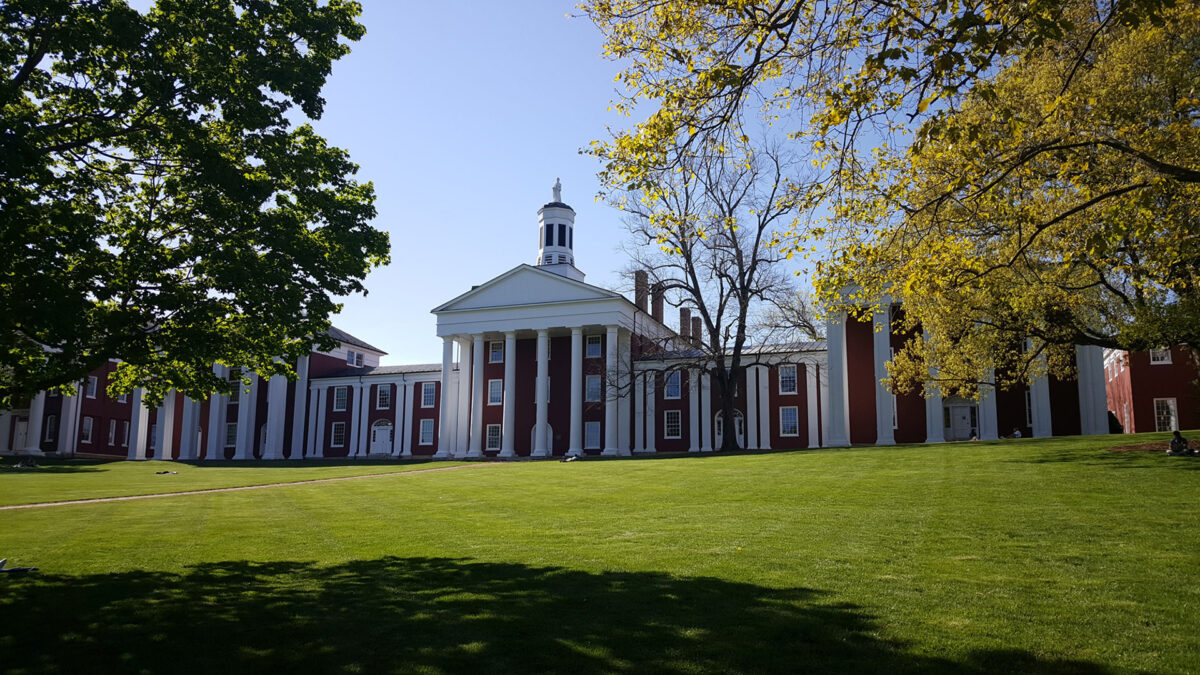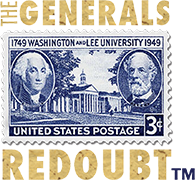On George Washington’s Birthday

In early June of 2021, the Board of Trustees of Washington and Lee University announced its plan to retain the name of the university. At the same time, it took a number of other steps. Among these was to discontinue Founders’ Day. For the past three years, The Generals Redoubt has sought to keep the tradition alive. This year celebrations were held in Lexington at the Patton Room in the Georges Hotel on January 19th and at our new headquarters, Fancy Hill, on January 20th.
The following week, we held celebrations in Kansas City and Houston, with more planned for future years. We remain hopeful Founders’ Day will be restored to the university calendar in the near future.
As current guardians of this tradition, this year we introduced two new features. One was to include William Graham as a Founder, alongside George Washington and Robert E. Lee. The second was to compose a toast to the three of them as an expanded founding cohort. A brief biographical introduction to Reverend Graham is found below, as is the toast that was recited at this year’s four celebrations.
We are also interested in reporting to you an unusual event that occurred at the end of the Patton Room celebration. An attending alumnus requested closing the meeting by leading the singing of the W&L Swing.
The rendition that followed was spirited, on key and refreshing to many who had not heard or sung it for a good while. Most surprising is that a number of student guests expressed being totally unfamiliar with it, an indication this is likely another tradition that has been eliminated from the university’s accumulated history. It is expected that future celebrations of Founders’ Day by The Generals Redoubt will add this musical touch to the program. We asked Neely Young, one of our founders, to do some research on the Swing, and you will find his story below.
We close this birthday salute to George Washington with a quote declaring his strong belief that a goal of higher education should be to teach students the foundational history and values of their country. In his Eighth Annual Message, he said: “In a republic what species of knowledge can be equally important and what duty more pressing on its legislature than to patronize a plan for communicating it to those who are to be the future guardians of the liberties of the country?” *
Introducing The Reverend William Graham Founders Day – Lexington, VA
January 19, 2024
I am pleased to add to today’s celebration, the name of the Reverend William Graham. Born in Paxton, Pennsylvania on December 19, 1742, he was home schooled by his parents. During his teenage years, he became interested in Christian and religious beliefs . Through coaching from his parents and Presbyterians ministers, he matriculated to the College of New Jersey in 1769. There he studied moral philosophy under John Witherspoon, president of the college now known as Princeton University. Witherspoon also encouraged Graham on his emerging interest in the study of natural or scientific philosophy.
In the fall of 1774, his life took him to Mt. Pleasant, Virginia near Fairfield, where he became a teacher at Augusta Academy. Two years later, having completed his studies and established himself as a Presbyterian minister, he became the Rector of the newly named Liberty Hall Academy. His service there covered the period 1774-1796. It was during his last year that Graham wrote George Washington requesting he donate the 100 shares of James River Company canal stock that the Virginia legislature gifted him for his service to Virginia and the United States.
The italicized paragraph from Graham’s letter to Washington will be of interest:
And here we cannot allow ourselves to think it proper to pray you [Washington] to grant the donation for the support of education in this Seminary, as a matter of honour or emolument to ourselves, or emolument to the neighbourhood where it stands. This would be selfish and invidious and inconsistent with the feelings of that mind, which always overlooks private interest to embrace and secure the public good. We beg leave only to state a few facts for your Excellency’s information, that you may be enabled to decide the important question with greater precision. **
Reverend Graham’s remains are interred near Lee Chapel and are in need of much caretaking. Without doubt he is due honor and respect as a founder of Washington and Lee University, and it is our purpose todo so today in the proposed toast that awaits.
A Founders Toast to Rev. Graham, and Namesakes Washington and Lee
January 19-20, 2024
Ladies & Gentlemen:
The following salute is offered to William Graham, George Washington and Robert Edward Lee.
To our Founder William Graham, Rector of Liberty Hall Academy, 1776-96 and correspondent with George Washington on his gift to Liberty Hall Academy; to our patron General and President George Washington, prime benefactor of our colonial revolution, overseer of the birth of America’s constitutional republic, and prescient rescuer of Liberty Hall Academy; and to our patron General and President Robert Edward Lee, first responder to a nearly bankrupt Washington College, brilliant educational innovator, and critical leader in reconciling the post-Civil War United States in search of a lasting and united peace and cultural harmony.
We salute them all as paragons of the University’s character of excellence, civility, humility, honor, public virtue and service and to steadfast commitment to non incautus futuri.
Please charge and raise your glasses to honor and salute the gifts of the fathers to our unforgettable and resilient alma mater.
May their memories be ever dear in our hearts and live on forever in our beloved Washington and Lee University.
Bring Back the Washington and Lee Swing!
In the early 20th century, a group of Washington and Lee students had a case of what can only be described as Fight Song “envy.” Michigan’s Hail to the Victors was written in 1898, while Georgia Tech’s Rambling Wreck and Notre Dame’s song were penned in 1908. “On Wisconsin” appeared in 1909. W&L was playing big time football at the time, and the students wanted their own distinct song. Mark Sheafe, perhaps borrowing from a slightly older Mexican tune, Zacatecas March, had written the tune in 1905, Thorton W. Shields committed the tune to paper in 1909, and Clarence A. (Tod) Robbins provided the lyrics in 1910. Since then, The Swing has become one of the most famous fight songs in American high schools and colleges although many people do not know its origins or its connection to our alma mater.
The story is told of a recently graduated W&L alum who arrived at the Tulane Law School in 1919 to discover that the fight song of that university was the Tulane Swing, with altered lyrics of course. It was also adopted as the fight song of Mississippi State, Gonzaga, Iowa State, and Slippery Rock. The number of high schools who have adopted The Swing is innumerable. It has even become the song of the Girl Scouts! The tune was particularly popular in the “Swing” era of the 1930’s and 1940’s and has been recorded by many Big Band, Dixieland, and Bluegrass groups.
And yet today many W&L students and recent alums do not know the history or words of The Swing. Many of those who do know the abbreviated tune don’t know that it was originally two verses with the tune of the first verse differing from that of the second. Let’s take a look at those verses:
Come cheer for Washington and Lee,
We’re going to win another victory!
The White and Blue we will ever wave in triumph
For the University, Rah! Rah! Rah!
Fight to the Finish. We are with you.
Break through the line on every play;
Rush the ball on down the field,
And we will win this this game today.
When Washington and Lee’s men fall in line
We’re going to win again another time.
For W&L I yell, I yell, I yell.
And for the University I yell like hell.
And we will fight, fight, fight for every yard,
Circle the ends and hit that line right hard.
And we will roll the enemy on the sod.
Yes, By God! Rah! Rah! Rah!
Hey!
*Our thanks to our friend Jenna Robinson, President of The James G. Martin Center for Academic Renewal, for providing the George Washington citation.
**Kamron Spivey ’24 provided the William Graham letter extract, research from Special Collections, and personal encouragement in recognition of William Graham’s role in founding the university, for which The Generals Redoubt is most grateful.
Please click on the link below to help preserve the values, traditions, and history of Washington and Lee. Your financial support of TGR enables us to bring thought-provoking speakers to campus, build bridges with the student body, and encourage the University to honor its heritage.
The Generals Redoubt (TGR) is a non-partisan 501 (c) (3) organization that is not aligned with, nor supports, any political party, individual, or organization.
https://www.thegeneralsredoubt.us/support
To donate by check please make payable to:
The Generals Redoubt and mail to: The Generals Redoubt, P.O. Box 1097, Lexington, VA 24450. Thank you.
